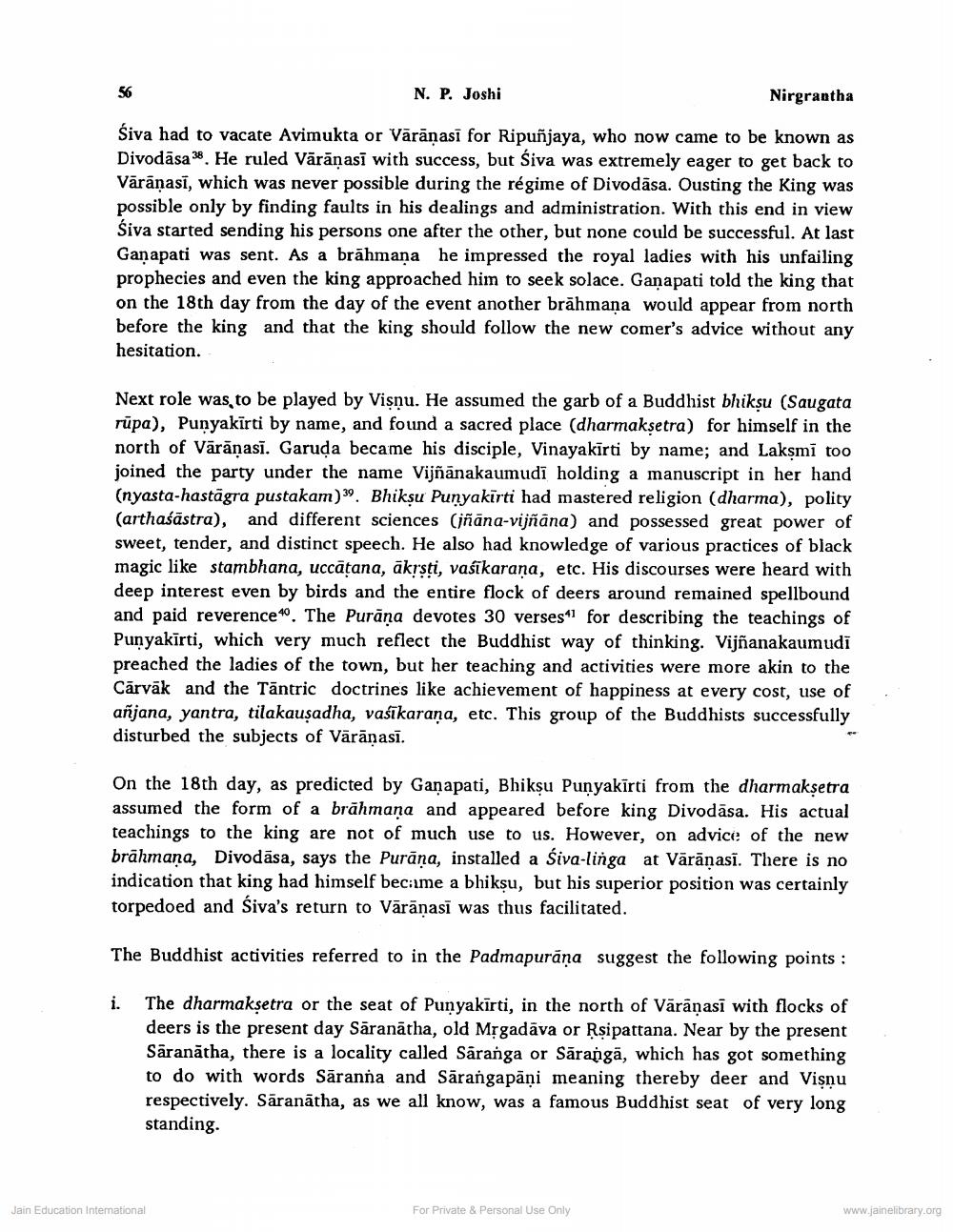________________
N. P. Joshi
Nirgrantha
Śiva had to vacate Avimukta or Vārānasi for Ripuñjaya, who now came to be known as Divodāsa 38. He ruled Vārāṇasī with success, but Siva was extremely eager to get back to Vārāṇasī, which was never possible during the régime of Divodāsa. Ousting the King was possible only by finding faults in his dealings and administration. With this end in view Śiva started sending his persons one after the other, but none could be successful. At last Ganapati was sent. As a brāhmaṇa he impressed the royal ladies with his unfailing prophecies and even the king approached him to seek solace. Ganapati told the king that on the 18th day from the day of the event another brāhmaṇa would appear from north before the king and that the king should follow the new comer's advice without any hesitation.
Next role was to be played by Visnu. He assumed the garb of a Buddhist bhikṣu (Saugata rūpa), Punyakīrti by name, and found a sacred place (dharmakşetra) for himself in the north of Vārāṇasī. Garuda became his disciple, Vinayakīrti by name; and Lakşmi too joined the party under the name Vijñānakaumudi holding a manuscript in her hand (nyasta-hastāgra pustakam) Bhikṣu Punyakirti had mastered religion (dharma), polity (arthaśāstra), and different sciences (jñāna-vijñāna) and possessed great power of sweet, tender, and distinct speech. He also had knowledge of various practices of black magic like stambhana, uccātana, ākrsti, vašīkarana, etc. His discourses were heard with deep interest even by birds and the entire flock of deers around remained spellbound and paid reverence. The Purāņa devotes 30 verses for describing the teachings of Punyakirti, which very much reflect the Buddhist way of thinking. Vijñanakaumudi preached the ladies of the town, but her teaching and activities were more akin to the Cārvāk and the Tāntric doctrines like achievement of happiness at every cost, use of añjana, yantra, tilakausadha, vašīkaraṇa, etc. This group of the Buddhists successfully disturbed the subjects of Värānasī.
On the 18th day, as predicted by Ganapati, Bhikṣu Punyakīrti from the dharmakşetra assumed the form of a brāhmana and appeared before king Divodāsa. His actual teachings to the king are not of much use to us. However, on advice of the new brāhmaṇa, Divodāsa, says the Purāņa, installed a śiva-linga at Vārāṇasī. There is no indication that king had himself became a bhikṣu, but his superior position was certainly torpedoed and Śiva's return to Vārāṇasī was thus facilitated.
The Buddhist activities referred to in the Padmapurana suggest the following points :
i.
The dharmakşetra or the seat of Punyakīrti, in the north of Vārāṇasi with flocks of deers is the present day Sāranātha, old Mrgadāva or Rsipattana. Near by the present Säranātha, there is a locality called Saranga or Sāranga, which has got something to do with words Sāranna and Sārangapāņi meaning thereby deer and Vişnu respectively. Säranātha, as we all know, was a famous Buddhist seat of very long standing
Jain Education International
For Private & Personal Use Only
www.jainelibrary.org




